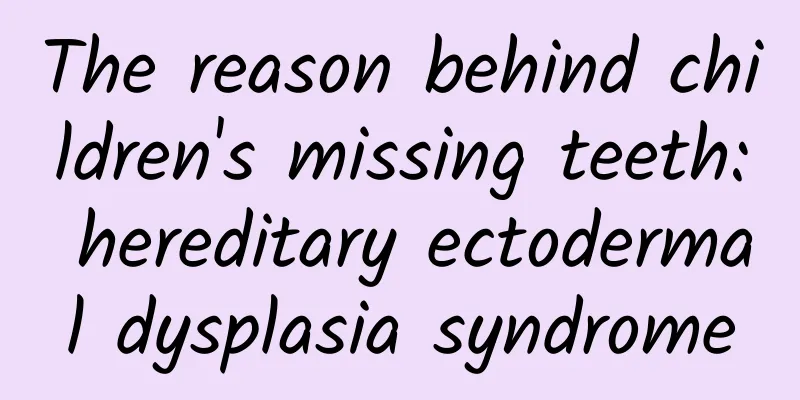The reason behind children's missing teeth: hereditary ectodermal dysplasia syndrome

|
This is the 5362nd article of Da Yi Xiao Hu A 1 year and 5 month old boy was brought to the doctor by his mother and grandmother. The reason for the visit was that the child was so late in growing teeth, and only had 2 small teeth in the maxillary front teeth area. These two small teeth began to erupt when the child was 12 months old. The teeth were pointed and cone-shaped, and the shape was a bit strange. After 5 months, the child still had no other new teeth. The mother was very worried and wanted to know what caused the child's teeth to "erupt late"! The first impression was that the child's hair and eyebrows were sparse, and the lips were thick. Two symmetrical small conical teeth were visible in the maxillary anterior teeth area. We inquired about the medical history in detail. The child was 37 weeks old, delivered naturally, and weighed 3kg at birth. History of allergies: None. There is a history of long-term nasal congestion and neonatal eczema. There have been many unexplained low fevers, little sweating on weekdays, and fear of heat. The parents said that they didn't know that the child was afraid of heat at first. In the summer in the south, the child often behaved very irritably. One day, the child's mother accidentally discovered that she took the child to the air-conditioned room, and the child was much quieter. The careful mother realized that the child was very afraid of heat and rarely sweated. Physical examination: The eyebrow arch and forehead are high, the bridge of the nose is collapsed, the eyebrows and hair are sparse, the lips are everted, thickened and protruding, and the fingernails (toenails) are developed normally. Two symmetrical conical teeth can be seen in the front of the maxilla in the mouth, with sharp cusps, and no other teeth have erupted. In addition to the abnormal maxillofacial development, no obvious abnormalities were found in the child's hands and feet. The child's previous routine health check-up results showed that his motor development was delayed. He was given specialist intervention and recommended to undergo follow-up after evaluation. The child's grandmother said that the child just didn't grow teeth and understood everything he was told. Preliminary diagnosis: The child was considered to have hereditary ectodermal dysplasia syndrome and was recommended to be confirmed by pediatrics. The patient went to a pediatric specialist for treatment and underwent genetic testing, which confirmed the relevant diagnosis. There are large individual differences in the time of eruption of baby's deciduous teeth. The earliest child may begin to erupt the first deciduous tooth at around 4 months, while the later child may not grow the first deciduous tooth until around 1 year old. This is normal. If the baby develops normally in other aspects, there is no need to worry too much. If the tooth has not erupted after more than 1 year old, it is recommended to seek medical attention in time, consult a professional doctor, conduct relevant examinations, identify the cause and take corresponding measures. This patient had syndromic congenital tooth agenesis, which is related to hereditary ectodermal dysplasia. Ectodermal dysplasia syndrome is a group of developmental defects caused by ectodermal structural maldevelopment. It mainly affects tissues developed from the ectoderm, including teeth, hair, sweat glands, etc. Tooth loss (no teeth or few teeth) is one of its typical manifestations. Partial or complete loss of deciduous and permanent teeth has a significant impact on the patient's oral function and quality of life. In addition, the hair is sparse (no hair or little hair); the sweat glands are lacking and cannot sweat (little sweat or no sweat). Missing teeth in children is a matter of great concern to parents. Whether it is the loss of deciduous teeth or permanent teeth, it may affect the child's oral health, chewing function, pronunciation and maxillofacial development. Parents should seek medical examination in time according to the overall development of the child, identify the cause and take appropriate measures. Author: Department of Stomatology, Affiliated Hospital of Guangdong Medical University Jia ShujuanDeputy Chief Physician |
>>: Will tonsil removal in children affect immune function?
Recommend
The blood test showed no pregnancy, right?
Pregnancy can be said to be a big event for every...
Tingling sensation in one breast
Some female friends say that only one side of the...
Is it necessary to add alkali to yeast dough? What will happen if alkali is added to yeast dough?
We all know that when making pasta, it is general...
Musculoskeletal ultrasound—correct interpretation of common terms!
Author: Guo Ruijun, Chief Physician, Beijing Chao...
Bleeding 20 days after medical abortion
If there is still vaginal bleeding 20 days after ...
Can I get eyelash extensions while breastfeeding?
Everyone loves beauty. Many mothers after giving ...
34 weeks amniotic fluid index problem description
For so-called expectant mothers, the issue of amn...
What to do if mastitis recurs
Postpartum women often suffer from a series of br...
What to eat to delay menstruation
Menstruation is a normal physiological phenomenon...
White spots on nails = calcium deficiency? Don’t be fooled, the truth is...
"White spots on the nails mean calcium defic...
What should I eat when I have stomach pain during menstruation?
People’s understanding of dysmenorrhea generally ...
Can I train my abs during my period?
With the development of society, women's requ...
There is white residue after sex
In real life, harmonious sex life between couples...
There is a dirty mark in the middle of the cleavage that cannot be washed off
The breast is an important part of the female bod...
Was the nine-square grid in hot pot originally used to distinguish the spiciness? What is the difference between Chongqing hot pot and Sichuan hot pot?
When stewing hot pot, the boiling point of red so...




![[Fat Bear Science] When you feel a lump, does your heart feel cold? Don't panic, a lump can be flattened](/upload/images/67f1e85cc102a.webp)




